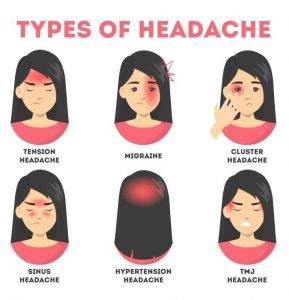Headaches
If you suffer from headaches or migraines, you’re not alone. Every 10 seconds, someone in the U.S. goes to the emergency room complaining of severe headache, according to the Migraine Research Foundation.
While headaches and migraines are among the most common disorders of the human nervous system, treatment may be necessary when they occur repeatedly and prevent patients from living a normal life.
Types of headaches:
- Migraine
- Tension headache
- Cluster headache
- Trigeminal neuralgia
- Cervicogenic headache (cervical spine related)
- Rebound headache
- Sinus headache
As suggested from above headache may arise from cause within the head or neck (primary headache) or some other causes (secondary headache).
What Causes Headaches?
Many factors can trigger a headache or migraine. The good news is that most causes are not the result of a serious illness. However, if they are frequent or sudden, this could be a symptom of a bigger problem such as a brain tumor or aneurysm. As a safety precaution, you should seek the help of a medical professional right away to rule out any underlying major health issues.
Some of the more common causes for headaches include:
- irregular sleep patterns
- caffeine withdrawal
- alcohol use
- overusing certain medications
- premenstrual syndrome
- stress
- depression
- anxiety
- whiplash injuries
- head injury
- abnormal head or neck position for an extended period of time
- tight muscles in the jaw, scalp, neck, or shoulders
- an underlying illness
- genetics
- cigarette smoking
- certain foods (chocolate, certain cheeses, MSG, etc.)
There are some cases in which headaches can be a sign of a more serious problem. Such instances include:
- high blood pressure
- brain tumor
- brain infection
- fluid buildup inside of the skull
- pressure buildup inside of the skull
- carbon monoxide poisoning
- sleep apnea (lack of oxygen while sleeping)
- bleeding between the brain and the thin tissue covering the brain
- problems with blood vessels or bleeding in the brain
You need to consult with your physician, if you are experiencing frequent or sudden headaches.
Common Symptoms of Headaches
Depending on the type of headache you have, the symptoms will vary from person to person
Tension headache symptoms
- headache on both sides of the head
- band like sensation around your head
- dull or squeezing pain
- tight or sore jaw, neck, or shoulders
- loss of appetite
- loss of sleep
- pain in the eyes or sinuses
- become worse as the day goes on
Migraine headache symptoms
- severe headache on one side of your head (throbbing, pulsating, or pounding pain)
- vision changes
- sensitivity to light or sound
- nausea or vomiting
Cluster headache symptoms
- headache episodes that last from 30-90 minutes each
- headache that awakes you from sleeping
- headache that occurs at approximately the same time each day
- excruciating pain
- headache around or behind one eye
- the affected eye may become watery, red, or inflamed
- the nostril on the affected side can become runny or congested
Treatment and Care Options
Many treatment options exist for headache and migraine sufferers. Treatment options include:
- Over-the-counter medications (aspirin, ibuprofen, acetaminophen, naproxen, excedrin etc).
- Massages
- Biofeedback
- Stress management techniques
Interventional Procedures
- BOTOX®
- Occipital nerve block
- Epidural Blood patch
- Diagnostic cervical median branch block
- Radiofrequency nerve ablation (RFA)
- Ketamine infusions
For patients who are good candidates for BOTOX®, the neurotoxin helps by blocking the release of chemicals involved in pain transmission.
In an Occipital nerve block, nerves are made less sensitive with a steroid injection. This stops the flow of information, especially pain signals, from these nerves, resulting in a decrease in chronic headaches. Ask our pain specialist for details on these therapies for management of your pain.
People experiencing post spinal headaches due to spinal fluid leak after a spinal procedure, whether its related to spine surgery or CT myelogram. Positional headaches can be successfully relieved by Epidural Blood patch.
For Cervicogenic headaches (cervical spine related), we need to isolate the specific cause in your cervical spine. During physical exam and through your Imaging studies ( cervical spine X-ray or MRI), we may proceed with diagnostic Cervical median branch block, followed by Radio-frequency nerve ablation to help with your persistent headache and neck pain.
Ketamine Infusions: People who have failed multiple medication trials, including Botox and still experiencing chronic headaches, we may offer series of Ketamine infusions for pain relief.
Managing and Living with Headaches
Living with frequent headaches can be very taxing, especially when you have to work, study or perform other daily tasks. However, there are few things you can practice to reduce the burden of these headaches.
- Learn sleep hygiene to have enough restful sleep every night. Avoid sedatives or alcohol to have good quality of sleep.
- Learn ways to relax and relieve daily stress. You may find practicing yoga, meditation, deep breathing, or lying in quit dark room relaxing.
- Take over-the-counter (OTC) medications, if needed. Check with your doctor if you are needing frequent or daily OTC medications. You may be having more headaches due to overuse of these medications.
- Try to treat your symptoms right away. If you start to feel a headache especially migraine coming on, start doing any of these at-home remedies instead of waiting until you have a full-blown, pounding headache.
- Always drink plenty of water. It is very important to stay hydrated.
- Keep a diary to keep track of your headaches, especially if you experience frequent headaches or migraines. Doing so will help you and your doctor determine your triggers.
